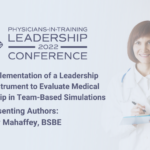Abstract | April 6, 2022
Design and Implementation of a Leadership Assessment Instrument to Evaluate Medical Student Leadership in Team-Based Simulations
Learning Objectives
- Describe the construct of physician leadership;
- Discuss the validation of the medical leadership behaviors that can be observed in team-based medical student simulations;
- Consider how medical student leadership development can be measured and developed through longitudinal assessment.
Background: Physician leadership in the clinical setting is a crucial skill that improves team dynamics and patient outcomes. Yet, medical graduates often assume the leadership role without formal training or iterative feedback. Many medical schools have implemented simulation-based learning, where multiple students engage in a simulated patient encounter, to enhance the clinical competence of students. The simulation setting as a learning modality provides a constructive time and framework during which students’ clinical leadership may be assessed.The goal of this project was to design a valid and reliable tool to assess medical students’ leadership skills in team-based simulation, with the purpose of providing students iterative feedback on their performance for longitudinal improvement.
Methods/Design: We systematically searched PubMed, Education Resources Information Center, Academic Search Complete, and Education Full Text databases for peer-reviewed English-language articles published 1980–2014 describing leadership in medicine and in medical curricula. By identifying the common qualities seen throughout the current literature and synthesizing them into discrete, measurable simulation skills, we developed a set of observable actions, grouped under three skill domains: clinical reasoning, patient communication, and team communication. A single-page rubric with 14 individual items was created, and after expert review to establish construct validity, the tool was piloted in a teambased simulation with 46 second-year medical students.
Results: Pilot data was analyzed in SPSS, and the internal consistency of the instrument was estimated with a Cronbach’s alpha (α = 0.685). To further improve the reliability for the instrument, one item was refined, and one item was removed. The scale was also refined from a 3-point to a 5-point Likert scale to improve sensitivity. After additional review by faculty, the instrument was approved by the Curriculum Oversight Committee’s Assessment subcommittee to be used in the upcoming term.
Conclusions/Implications: Implementation of the leadership assessment instrument in the medical curriculum will provide students with objective feedback on their leadership in the simulation setting. Longitudinal tracking will promote continued development of these skills as we hope to transition medical students to lead clinical teams effectively after graduation.
References and Resources:
- Collins-Nakai R. Leadership in medicine. Mcgill J Med. 2006;9(1):68-73.
- Fletcher G, Flin R, McGeorge P, Glavin R, Maran N, Patey R. Anaesthetists’ Non‐Technical Skills (ANTS): evaluation of a behavioural marker system†, BJA: British Journal of Anaesthesia, Volume 90, Issue 5, May 2003, Pages 580–588, https://doi.org/10.1093/bja/aeg112.
- Richard K, Noujaim M, Thorndyke LE, Fischer MA. Preparing Medical Students to Be Physician Leaders: A Leadership Training Program for Students Designed and Led by Students. MedEdPORTAL. 2019;15:10863. Published 2019 Dec 13. doi:10.15766/mep_2374-8265.10863.
- Goldstein, Adam O. MD, MPH; Calleson, Diane PhD; Bearman, Rachel MA; Steiner, Beat D. MD, MPH; Frasier, Pamela Y. PhD; Slatt, Lisa MEd Teaching Advanced Leadership Skills in Community Service (ALSCS) to Medical Students, Academic Medicine: June 2009 – Volume 84 – Issue 6 – p 754-764 doi: 10.1097/ACM.0b013e3181a40660
- Leenstra NF, Jung OC, Cnossen F, Jaarsma ADC, Tulleken JE. Development and Evaluation of the Taxonomy of Trauma Leadership Skills-Shortened for Observation and Reflection in Training: A Practical Tool for Observing and Reflecting on Trauma Leadership Performance. Simul Healthc. 2021 Feb 1;16(1):37-45. doi: 10.1097

